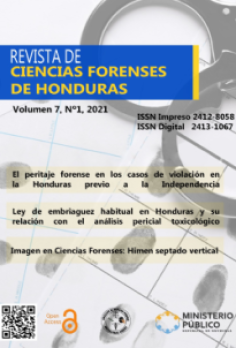Habitual drunkenness law in Honduras and its relationship with the toxicological expert analysis
DOI:
https://doi.org/10.5377/rcfh.v7i1.11818Keywords:
Blood alcohol, Habitual drunkenness law, International prohibitive scale, Gas Chromatography, Detection limit, HondurasAbstract
Despite the fact that the number of traffic accidents involving drunk drivers has skyrocketed, and that legislators are under great pressure to find a reasonable solution to the issue of driving under the influence, especially as regards the maximum limits allowed, that relationship between the legal and the scientific, is not always specified. The test for the determination of alcohol in biological samples that is carried out in the Forensic Toxicology laboratories of the Directorate of Forensic Medicine was validated and accredited. This validation process allowed to observe that the value referred to in the Law of Penalization of Habitual Drunkenness ,point outs values that could indicate an error in the application of the units and if not, this value is not significant in terms of the determination and quantification of ethanol by the detection limit methodology currently used in laboratories. The importance of the advice of the scientific technician for the proper use of units and reference values is essential for an objective interpretation of our legislation and facilitates the meeting point in forensic science and legal science.
Downloads
789
HTML (Español (España)) 59
Published
How to Cite
Issue
Section
License
El autor conserva los derechos de autor bajo los terminos de una licencia CC NC 4.0





